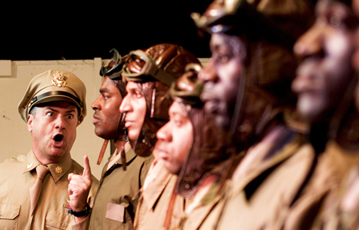History is often the domain of those who write it. If there is no interest in recording the stories of those who are deemed periphereal, the narratives get lost. In Lanyon Gray's off-Broadway production of "Black Angels over Tuskegee," the story of African-Americans pilots, who broke ground while heeding the call to serve their country, is explored. It is delivered with an eye to both disseminating information and considering the psychological effects of prejudice.
Gray, who acts in the drama, as well as having written and directed it, sets his story on a spare stage. Act I uses six chairs, an American flag, a photo of Roosevelt, and an Uncle Sam "I Want You" poster as props. The popular '40s tune "Straighten Up and Fly Right" places the era. A recruitment image of a black pilot underscores the theme.
We are introduced to six men who have traveled to Utah to take on the challenge of a qualifying test. It is made clear that many white officers are hoping for their failure, as they repeatedly refer to "Negro soldiers" as being "lazy," having "a small brain," and being unable to do "tech work." Although the men reference the model of Bessie Coleman, a black woman who had been a pilot in France, they are constantly dealing with "expectations for their failure."
Kept waiting for two hours before they are allowed to take the exam, they talk about the need to stay focused for "their whole race." The conversations between the men reveal their respective backgrounds, histories and anecdotes about the indignities they have suffered under the strictures of Jim Crow. They agree, disagree and share their philosophies, which include: "There are no small mistakes," "Think beyond the slave mentality," and, "You've got to play the game." They discuss leadership, discipline and education as a key to freedom, while invariably acknowledging the reality that "they don't want us here."
After they have passed the test with ease, the second act transports them to barracks in Alabama. On the trip there, they have been forced to give up their train seats to German POWs and move to the last car. While undergoing training, the message is, "We can't have any mistakes." They adapt the attitude that the antidote to racism is excellence. Their motto is, "Train me. Let me demonstrate that I can." On Jan. 31, 1943, the men receive their wings and are sent to North Africa, where they are installed on a separate base. One of the characters quips, "So they gonna keep us segregated in Africa, too?" As part of the 99th Pursuit Squadron, they were used only for groundwork.
Finally, they get assigned to the European Theater, where they serve in Italy as escorts. As part of the 322nd fighter Group, they become a highly requested unit. Their airplanes, easily recognized by the tails that were painted red, garnered them the nickname of the "Red Tail Angels."
Speaking with Gray after the performance, he told me, "The facts are true, but the storyline is fictional. As a playwright, I had the opportunity to create knowledge."
For those unfamiliar with this chapter of America's World War II story, "Black Angels over Tuskegee" gives them the opportunity to acquaint themselves with this worthy account.

Photo courtesy of Alexandra Marlin
A version of this article originally appeared on the website mgyerman.com.
